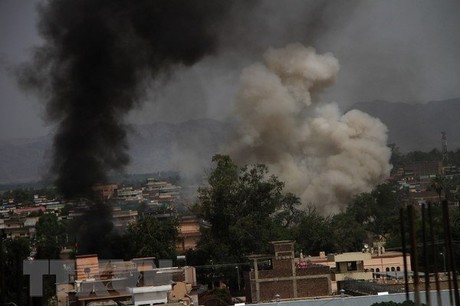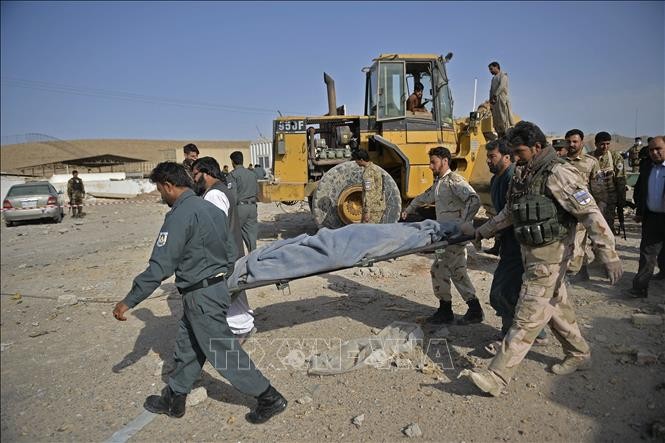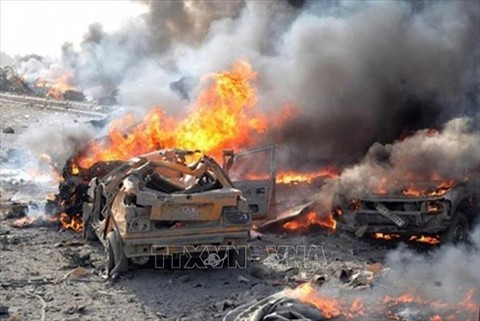(VOVWORLD) -September 11 this year marks the 21st anniversary of bloody terrorist attacks against targets in the US, which killed nearly 3,000 people. Since this world-changing incident, the US and the rest of the world have conducted counter-terrorism operations of different scales. However, for many reasons, the global war on terrorism is not yet over and terrorism remains one of the major challenges.
 Smoke rises from a terrorist bombing in Afghanistan. Photo: VNA Smoke rises from a terrorist bombing in Afghanistan. Photo: VNA |
There has not been any independent overview report on the damage and loss caused by terrorist activities on a global scale after the September 11 attacks. No accurate statistics have been released on the total number of counter-terrorism operations launched by countries. But there’s a recognition by the United Nations, experts, and international organizations that terrorism is still posing one of the biggest threats to national and global stability.
Grave and potentially permanent challenges
One of the clearest examples of the complexity of terrorism is Afghanistan, the first target of the US-led global counter-terrorism campaign after the September attacks. On October 7, 2001, the US and its allies launched a large-scale offensive operation in Afghanistan with the goal of eliminating terrorism. The campaign ended in August 2021 with the Taliban returning to power. After the nearly 20-year counter-terrorism campaign that left more than 3,500 American and allied soldiers dead, terrorist groups are still raging and continuously committing horrific crimes in Afghanistan. The latest is the car bomb attack outside the Russian Embassy in Kabul by the Islamic State terrorist organization (IS) on September 5. At least two senior diplomats were killed and 20 others injured in the attack.
IS also has a strong presence in dozens of other countries, mostly in the Middle East. At one time in 2014 IS controlled up to one third of the territory of Iraq and large areas of Syria and Libya. The notorious global terrorist organization Al Qaeda has committed crimes in many parts of the world despite the US’s killing its top leaders: Osama bin Laden killed in 2011 and Ayman Al-Zawahiri eliminated in July 2022.
 Afghan security forces carry the body of a victim at the site of a bombing in Herat province, April 1, 2021. Photo: AFP/VNA Afghan security forces carry the body of a victim at the site of a bombing in Herat province, April 1, 2021. Photo: AFP/VNA
|
Not only are the attacks more brutal and bloodier, but the tactics and methods of terrorist attacks are increasingly sophisticated and difficult to deal with. In his remarks on International Day of Remembrance for the Victims of Terrorism in August, UN Under-Secretary-General Vladimir Voronkov said terrorist organizations are changing the way they operate, including taking advantage of the Internet to propagate incitement, recruit sympathizers, and mobilize resources.
International cooperation strengthened
According to a UN report most victims of terrorism are innocent people in the wrong place at the wrong time. Innocent civilians are the most vulnerable to terrorist activities. This shows the senselessness, cruelty, and inhumanity of all acts of terrorism under any name or cover.
 The scene of a bomb attack in Raqqa, Syria. Photo: VNA The scene of a bomb attack in Raqqa, Syria. Photo: VNA
|
In a special message on this year’s International Day of Remembrance for the Victims of Terrorism, themed "Memories", UN Secretary-General Antonio Guterres once again called on nations to take practical action to turn painful memories into a powerful effort to halt terrorism worldwide.
Guterres said, “We commit to support survivors scarred by heinous acts of terrorism by amplifying their voices, protecting their rights, and seeking justice. And by mobilizing Member States to provide the legal, medical, psycho-social, and financial support they need to heal and live with dignity.”
Analysts say the war on terror calls for a cooperative effort based on respecting differences in ethnicity, religion, belief, culture, and ideology by all countries, communities, and individuals around the world.